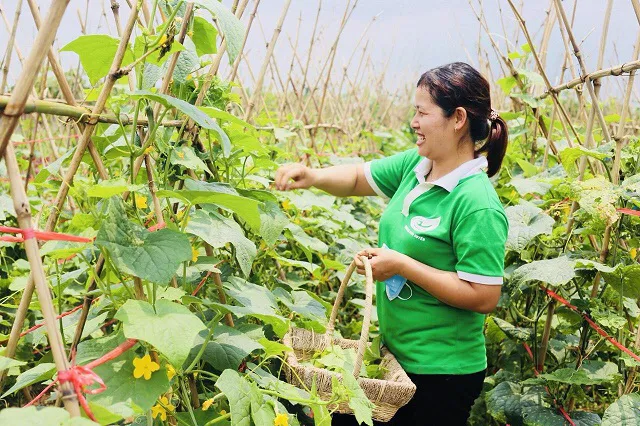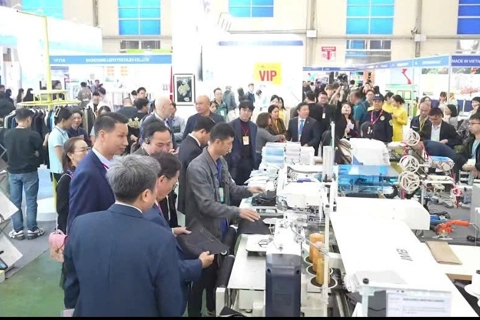Planning: A key task for Hanoi to promote organic farming
Hanoi aims to develop both organic farming and organic livestock equally on a city-wide scale.
In order to ensure the effective and sustainable development of organic agriculture in Hanoi, the agricultural sector will have to conduct careful planning to identify areas that truly have favorable conditions for successful organic farming.
| Safe and organic vegetable production model of Vinh Ha Company in Hong Thai Commune, Phu Xuyen District, Hanoi. Photo: Ngoc Anh/The Hanoi Times |
Hanoi has been an early adopter of organic agriculture since 2008, and by 2013, the agricultural sector had already introduced temporary standards and production processes for organic farming.
Since then, the city has consistently prioritized the development of organic agriculture, especially after the issuance of Government Decree No. 109/2018/ND-CP on Organic Agriculture in 2018. By providing an official national standard, the decree has instilled confidence among investors and consumers who prefer organic agricultural products in Hanoi.
Over the past decade, Hanoi has gained valuable experience in the sustainable development of organic agriculture. One key lesson is that people passionate about agriculture and interested in transitioning to organic methods should start small, as organic farming requires a dedicated and gradual process to establish its presence, according to experts.
In addition, organizing the agricultural industry according to value chains, establishing and registering trademarks, and communicating effectively with consumers are essential steps to ensure that organic agricultural products offer distinct value compared to conventional counterparts.
When it comes to specific areas within organic agriculture in Hanoi, farming faces significant challenges, mainly due to the time-consuming nature of converting and improving soil quality and microclimates. It requires adherence to new processes to ensure the production of organic products.
One of the most challenging aspects of organic farming is the sourcing of inputs such as feed and veterinary medicines. While the horticulture sector is generally thriving under organic practices, it is important to note that Hanoi aims to develop both organic agriculture and organic livestock equally on a citywide scale.
This is because successful organic models worldwide often involve the parallel development of crops and livestock.
Substantive solutions
Effective and sustainable development of organic agriculture depends heavily on proper planning. Therefore, it is essential to review and identify areas that are truly conducive to the growth of organic agriculture. In addition, the establishment of certification organizations with adequate analytical and certification capacity is crucial. These organizations ensure transparency by evaluating organic standards and certifying the authenticity of organic products.
By taking these measures, Vietnam's organic products can gain recognition on the international stage, which will facilitate export opportunities and create favorable conditions for the overall development of organic agriculture.
It is also important to develop a brand and possibly a certification mark specifically for organic agriculture based on the established planning and certification requirements.
In addition, the establishment of a chain production system is highly necessary. This involves linking the value chain of organic agricultural products from production to processing and consumption. The application of advanced technology in processing and refining should be prioritized to produce high-value organic agricultural products. It is also important to focus on developing organic medicinal herbs, especially functional foods, with Vietnamese brands.
To ensure the sustainable development of organic agriculture, the Hanoi People's Committee issued Plan No. 220/KH-UBND on August 15, 2022. This plan focuses on developing organic agricultural production from 2022 to 2025, with a long-term vision for 2030.
In this regard, the agricultural sector is actively involved in constructing organic agricultural production models that incorporate advanced techniques and strict quality control processes. These models aim to obtain national and international certification for organic agriculture.
At the same time, local authorities are formulating specific plans to support farmers, cooperatives and businesses. This support covers various aspects, including the development of production infrastructure, the provision of technical training, and assistance with branding.
Emphasizing the use of high-tech applications in organic production, the Hanoi Department of Agriculture and Rural Development, in cooperation with local authorities, will strategize concentrated production areas for organic agricultural products. These areas will be selected based on market demand and suitability with local conditions. In addition, efforts will be made to organize fairs and use online platforms to promote organic products and explore potential markets for product consumption. Support will also be provided to cooperatives and enterprises to facilitate the integration of organic products into modern, export-oriented distribution channels.












